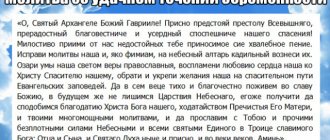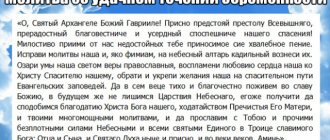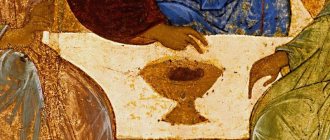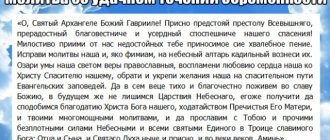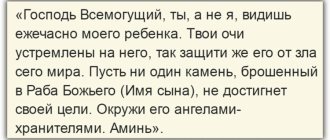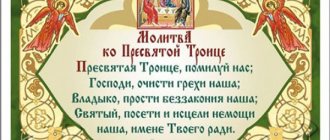The themes of M. Yu. Lermontov's lyrics are very diverse, but, undoubtedly, numerous texts of philosophical content occupy an important and significant place in it. The poet actively explores human nature and the laws of the universe, doubts, rushes about, loses faith and finds it again - all this is reflected in his work. The beautiful, sincere and bright poem “Prayer” reveals to the reader another facet of Lermontov’s spiritual quest. The poet talks about the power of faith and its ability to heal and dispel human sorrows. A detailed analysis of the work according to the plan that the Many-Wise Litrekon presents to your attention will help you understand all the thoughts and images collected in the poem.
History of creation
The theme of prayer occupies a special place in Lermontov's lyrics. Raised in the Christian tradition, the poet often addressed God in his texts; this could be a request for help and protection or some kind of dispute with the Almighty, but always a certain sacrament where the poet had the opportunity to talk about the most intimate.
"The Prayer" was written in 1839. During this period, Lermontov often visited the Karamzin salon, where he met the young princess Maria Alekseevna Shcherbatova. According to friends, the intelligent and beautiful princess admired the work of the young poet. The young people were passionate about each other.
In conversations with the princess, Lermontov talked about the melancholy that often overtakes him alone, and Maria Alekseevna once advised him her proven way of dealing with this illness: sincere prayer, which disperses any despondency. Taking her words seriously and valuing her friendship, the poet listened and soon created his “Prayer.”
The poem was published in 1842, after the death of the poet.
About the origin of the Lermontov family and the upbringing of the poet
Before we begin to consider the work of Mikhail Yuryevich, it is necessary to write a few sentences about where the poet with such an unusual surname for the then Russian ear came from in Russia at the beginning of the 19th century. So, in all likelihood, Lermontov’s ancestors came from Scotland and traced their origins back to Thomas Lermont, the legendary Celtic bard who lived in Scotland in the 13th century. Looking ahead, let us point out one interesting detail: the great English poet George Byron, so respected by Lermontov, also considered himself among the descendants of Thomas Learmont, due to the fact that one of Byron’s ancestors was married to a woman from the Lermontov family. So, one of the representatives of this family was taken into Russian captivity at the beginning of the 17th century, entered military service, converted to Orthodoxy and became the founder of the Russian family of Lermontovs. However, it is worth noting that Mikhail Yuryevich himself initially associated his last name with Francisco Gomez Lerma, a Spanish statesman of the 16th century. This is reflected in the drama “The Spaniards” written by Lermontov. But the poet dedicated lines from the poem “Desire” to his Scottish roots. Lermontov spent his childhood in the Tarkhany estate in the Penza province. The poet was raised mainly by his grandmother, Elizaveta Alekseevna Arsenyeva, who loved her grandson madly. Little Misha was not in good health and suffered from scrofula. Due to his poor health and this illness, Misha could not spend his childhood the way many of his peers spent it, and therefore his own imagination became the main “toy” for him. But none of those around him or his relatives even noticed the poet’s inner state, nor his dreams and wanderings in “his own, other worlds.” It was then that Misha felt the same loneliness, gloominess and - from other people - misunderstanding that would accompany him throughout the rest of his life.
Genre, direction, size
The genre of the poem “Prayer” is a lyrical monologue in which the spiritual quest of the hero is revealed.
The hero’s loneliness among people and the search for peace through turning to God and higher powers make us recall the tradition of Romanticism, in the context of which it is customary to talk about Lermontov’s poetry.
The text can be classified as religious and philosophical lyrics. The main theme of the poem “Prayer” is the power of sincere faith and prayer, finding peace through turning to higher powers. At the same time, prayer turns out to be one of the ways of the general spiritual search of the lyrical hero, a step in understanding the surrounding world and its laws. In this regard, we can talk about the philosophical content of the poem.
“Prayer” is written in iambic trimeter using cross rhyme.
Lermontov's literary heritage
Lermontov's creative path, like his life, was very short, but extremely productive. His entire conscious literary activity - from his very first student attempts at writing to the writing of the pinnacle of his prose, the novel "A Hero of Our Time" - lasted a little more than twelve years. And during this time, the poet Lermontov managed to write more than four hundred poems, approximately thirty poems and six dramas, and the prose writer Lermontov also wrote three novels. Researchers usually divide the entire work of a writer into two periods: early and mature. The boundary between these periods is usually the second half of 1835 and the first half of 1836. But let us keep in mind that throughout his entire creative career, Lermontov remained faithful to his ideas, literary and life principles, which were formed at the very initial stage of his formation as a poet, as a person. Two great poets played a decisive role in the creative development of Mikhail Yuryevich: Pushkin and Byron. The characteristic tendency for Byron's poems towards romantic individualism, towards the depiction of the deepest spiritual passions, towards lyrical expression, towards the type of hero who is in conflict with the people around him, and sometimes with the whole society, manifests itself especially clearly in the poet's early lyrics. But the poet Lermontov still overcomes Byron’s influence on his work, which he writes about in his poem “No, I’m not Byron, I’m different...”, while Pushkin was and remained a constant literary reference point for him throughout his life. And if initially Lermontov directly imitated Pushkin, then already in the mature period of his work he consistently began to develop Pushkin’s ideas and traditions, sometimes as if entering into some kind of creative polemic with him. In his later work, Lermontov, we see, was completely disillusioned with life; he ceased to depict his inner world as something exceptional, but, on the contrary, began to move on to everyday feelings. However, he was never able to resolve his eternal question, which had tormented his soul since his youth. Or didn't have time.
Composition
The poem consists of three stanzas. In terms of brevity, semantic content and simplicity of expression, it is comparable to the very prayer it tells about.
- The first stanza depicts a difficult period that can happen in the life of any person, when “sadness is crowded in the heart.” Dejection, depression by circumstances and causeless sadness are what makes the lyrical hero seek peace and consolation in reading a prayer.
- Next, the poet describes prayer and the “graceful power” contained in it. Lermontov is fascinated by her mystery, admiring the “incomprehensible holy charm” that is born in the simple words of sincere and bright prayer.
- The final stanza describes the healing effect of prayer itself. Together with important words and shed tears, a heavy burden of sadness leaves a person’s soul, giving way to faith in the future and new bright hopes.
Prose M.Yu. Lermontov
And in Lermontov’s prose, the attitude towards introspection found fruitful embodiment, where it was transformed into the experience of creating a generalized psychological portrait of a “hero of his time”, absorbing the features of the entire generation and at the same time preserving both his individual face and the extraordinary nature of his own nature. Lermontov's prose grows on romantic soil, but the romantic principles in it are functionally changed and resubordinated to the tasks of realistic writing.
Lermontov's creativity is of great value for every person. Thanks to him, each of us thinks about the philosophical problems presented in novels and dramas. And probably every person knows Lermontov’s poems, at least one or two, by heart.
Images and symbols
The image of the lyrical hero in the poem “Prayer” is very close to the poet himself. Before us is a once doubting person who is sometimes overcome by heavy and sad thoughts, but he turns out to be able to find peace and enlightenment in reading a prayer. In moments when the hero is especially lonely and difficult, he invariably remembers the words of a familiar prayer and feels how light his soul becomes.
The central image becomes prayer itself as a kind of miraculous power that can dispel sadness and return a person to a bright view of himself and the world around him. This is a symbol of sincere, capable of working miracles, inner faith and, at the same time, human harmony with the world.
Lermontov's lyrics in the school curriculum
Nowadays, Lermontov's lyrics are actively studied as a compulsory program in literature classes, from junior to senior classes. First of all, poems are studied in which the main motives of Lermontov’s lyrics are clearly visible. Schoolchildren in elementary school get acquainted with the work of Mikhail Yuryevich, and only in high school do they study the “adult” lyrics of Lermontov (grade 10). Tenth-graders do not just study individual poems, but determine the main motifs of Lermontov’s poetry as a whole and learn to understand poetic texts.
Themes, mood and issues
In the poem “Prayer” Christian themes come to the fore.
- The main theme is faith
. The poet talks about the power of true faith and prayer. Simple words of prayer are capable of healing a person’s spiritual wounds and dispelling his doubts if he sincerely believes and does not just repeat, but lets these words pass through himself. - Another theme of the text is the search for spiritual harmony and peace
. Loneliness and the search for the meaning of life, characteristic of the hero of Romanticism, are also key for Lermontov. The lyrical hero often experiences anxiety and melancholy, he is overcome by doubts and indulges in heavy thoughts. This state of a person is contrasted in the poem with a calm and bright attitude when, after reading the prayer, the poet “breathes and cries, and so easily, easily...”.
The entire poem is imbued with a bright, upbeat mood - exactly the one described in the finale. This is achieved due to the increasing dynamics of the narrative from the first stanza to the final one and simple words that very accurately describe the emotional movements of the hero.
Political motives in Lermontov's works
Lermontov's lyrics and poems are the poet's testament to his descendants. And he bequeathed to serve the best human ideals, embodying them in eternal works of art. Many of Lermontov’s poems entered the hearts of his compatriots precisely during the days of national Russian mourning, for example, during the days of the death of the genius Pushkin, when the country mourned having lost its best poet. The author of the poem “To the Death of a Poet” shocked Pushkin’s friends and confused his enemies, thereby arousing hatred among the latter. The enemies of Pushkin, the poetic genius, also became the enemies of Lermontov. And such a struggle of Russian poetry with its enemies, stranglers and oppressors of its beloved Motherland continued through the efforts of Lermontov. And no matter how difficult this struggle was, victory still remained with Russian literature - one of the greatest world literatures. Before Lermontov, there was practically no case where a poet simply “threw” poems so strong and frank in the face of the government that they instantly caused a certain resonance in society: excitement and anxiety. This was Lermontov’s poem “On the Death of a Poet” and several others. This poem sounded not only as a voice of anger and sorrow, but, above all, of retribution. It reflects the tragedy of a progressive thinking personality in Russia in the first half of the 19th century.
main idea
The main thought and idea of the poem “Prayer” is the power of prayer, its ability to give a person peace of mind, protection from life’s anxieties and mental turmoil.
By the time the text was written, Lermontov was already a mature, mature poet with his own spiritual and philosophical position. The poet’s view of Christian values transformed throughout his creative career, and the meaning of his “Prayer” is an attempt to evaluate a person’s inner faith as a tool in the fight against despondency and sadness. The very act of turning to higher powers and believing in the power of sincere words coming from the heart becomes the first step towards finding a way out of the darkness of loneliness and despair. You can figuratively imagine this as an exit from a dark cave to daylight; it is “light” that becomes the main description of the state of the lyrical hero renewed after prayer.
Idea
The meaning of the text is that prayer helps to cope with adversity during difficult periods. If a person is a believer, then no matter how hard it is for him, he will not be left alone with his problems. A higher power can help and calm, even if loved ones have turned away.
The main idea of the “Prayer” is a call for a doubting and tossing person to find harmony within himself, purifying his soul through communication with higher powers. The poet deliberately does not say what kind of prayer he is talking about. Everyone must find their own language of communication with God and themselves.
Means of expression
The poem is quite small in volume, but contains many tropes that help the poet more figuratively and accurately express the idea contained in the text.
- Epithets are actively used, both simple and sublime, as if from the text of the prayer: “difficult moment”, “wonderful prayer”, “gracious power”, “holy beauty”.
- The picture of the hero’s visible and living spiritual changes is drawn with the help of metaphors: “sadness is crowded”, “an incomprehensible, holy charm breathes in them.”
- The poet’s free use of the phraseology “a stone has fallen from the soul” becomes very appropriate: “it will roll off the soul like a burden,” describes the state after reading Lermontov’s prayer. This image allows you to clearly depict how the hero’s mental heaviness is replaced by a feeling of extraordinary inner lightness.
- The very beautiful assonance “u” in the first stanza makes the text consonant with church hymns, adding melodiousness and viscousness to it.
- Among the syntactic means of expressiveness, it is worth noting the inversion (“I recite one wonderful prayer by heart”), which stylistically brings the poem closer to a religious text.
Among the religious and philosophical lyrics of M. Yu. Lermontov, the poem “Prayer” occupies a significant place. It expressed the poet’s painful spiritual quest, an attempt to heal from sadness, doubt and loneliness with the help of sincere words of prayer. Simple and, at the same time, sublime words and structures, composition, melody and means of expression make Lermontov’s lyrical text look like a prayer, endowing it with the wonderful power to give peace and light.
Author: Yulia Filipskaya
Analysis of the poem “Prayer” by Lermontov - 3 examples
Analysis example 1 History of creation M. Yu. Lermontov wrote this poem in 1839. At that time, his lover was M. A. Shcherbatova. She advised him to seek peace in the spiritual realm. The author listened to her words, although this work is quite unusual for such a skeptical person.
It was later included in the collected works, which was published in 1842.
Genre, direction, size
The genre of the poem can be described as a lyrical monologue. The text belongs to romanticism and is written in iambic with pyrrhic.
The author uses cross rhyme, that is, he combines the first line with the third, and the second with the fourth. Masculine rhyme (stress on the last syllable) and dactylic rhyme (stress on the third syllable from the end) are also used.
Composition
At the beginning of the work, the author writes about a difficult moment in life. One can feel the tension, sadness and dejection of the lyrical hero, who decided to try to find peace in turning to God. In the middle of the text, the poet describes feelings during prayer: sensations of grace-filled power and holy charm. At the end of the poem we see the consequences of the petition. A heavy burden fell from the hero’s shoulders, and he felt at ease. Images and symbols
In "Prayer" the burden is a symbol of doubt. It is what gnaws at the poet’s heart most of all. It is not surprising, because the author was a thinking person who often thought about the most serious moral, philosophical and creative issues. And every time, standing at a crossroads, he doubted.
In the image of the hero you can see the writer himself. At that time he was experiencing creative stagnation, and the author was in a bad mood. Only prayer helped him cope with despair.
Mood and motives
The poet reveals the motives for emotional tension and getting rid of it through prayer. The text conveys melancholy, then peace, and, finally, the power of the word of a believer.
M. Yu. Lermontov sets the reader in a positive mood, talking about the consolation found in turning to higher powers. This spiritual communication cleanses the soul and mind, giving strength to move on.
Topics and issues
The main theme of the work is tranquility through prayer, achieved thanks to the healing and cleansing power of spirituality. Themes of longing and sadness are also evident. A creative person is especially susceptible to mood swings, so it is very important for a poet to find a way to relieve the pain of his heart. He generously gifts the reader with this discovery.
The problematic answers our questions about spirituality and the power of repentance:
“How to find peace in the soul?”; “What can prayer do?”; “Can turning to God help in a difficult period of life?”
It is extremely important for a person to be able to escape from worldly worries and find harmony in his soul. Spirituality helps us in this, before which all the moral, everyday and psychological problems that troubled the author’s heart recede. These include sadness, indecisiveness and anxiety.
Idea
The meaning of the text is that prayer helps to cope with adversity during difficult periods. If a person is a believer, then no matter how hard it is for him, he will not be left alone with his problems. A higher power can help and calm, even if loved ones have turned away.
The main idea of the “Prayer” is a call for a doubting and tossing person to find harmony within himself, purifying his soul through communication with higher powers. The poet deliberately does not say what kind of prayer he is talking about. Everyone must find their own language of communication with God and themselves.
Means of artistic expression
The author uses epithets in the text. He calls the moment difficult, the prayer wonderful, the power of grace, the charm holy and incomprehensible. There are also personifications. Sadness is crowded and beauty breathes.
In addition, the poet speaks in the language of comparisons: doubt is like a burden.
Example of analysis 2 History of creation
If we consider the works of Mikhail Yuryevich Lermontov, it becomes clear that he assigns a special place to prayer in his life and work. This is not surprising, since the poet was brought up in Christian traditions. Quite often in his works there is an appeal to God, a request from the Almighty for help, or an argument with him. But at the same time, the poet constantly observed a certain sacrament in which he spoke about the most secret things.
The poet wrote the poem “Prayer” in 1839. During this period of time, the author very often visited the Karamzins’ salon, where he met Maria Alekseevna Shcherbatova. As his friends note, the young, intelligent and beautiful countess greatly admired his work. They were very interested in each other.
The author very often talked with the princess on secret, intimate topics. He admitted that in moments of loneliness he gets very sad. Then the young girl gave him advice that she herself followed. She suggested that the poet indulge in sincere prayer, thanks to which all ailments and despondency disappear. The poet took Maria Alekseevna’s words very seriously, since he valued his friendship with her very much. Soon the poem “Prayer” appeared. But the work was published after the death of Mikhail Yuryevich in 1842.
Genre, size
According to the genre, the work “Prayer” refers to a lyrical monologue that tells about the spiritual quest of the hero.
The hero is lonely among people, but he finds peace by turning to God and higher powers. This is all reminiscent of the traditions of Romanticism. The poem belongs to religious and philosophical lyrics. The main theme can be called the power of that very sincere faith and prayer, which gives peace and tranquility when a person turns to higher powers. At the same time, prayer becomes one of the hero’s spiritual quests when he begins to comprehend the world around him. All this points to the philosophical content of the work.
To write the poem, the author uses iambic trimeter and cross rhyme.
Composition
The poem “Prayer” consists of three stanzas. In terms of its content, semantic load, as well as the simplicity of the expression of thoughts, it can really be compared with the real prayer discussed in the work.
The first stanza of the work talks about a difficult period that absolutely anyone can face. At this moment the person becomes very sad and lonely. He is constantly depressed, he is suppressed by circumstances, and sadness also appears for no reason. The combination of all these factors forces our lyrical hero to resort to prayer, in which he finds peace and tranquility.
In a difficult moment of life, Is there sadness in my heart? I repeat one wonderful prayer by heart. In the second stanza, the poet begins to describe the prayer itself, and what power it contains. The poet is fascinated by her riddle, secret, and that same “incomprehensible holy charm” that is contained in such simple but sincere words.
There is a grace-filled power in the consonance of living words, and an incomprehensible, holy charm breathes in them. The final stanza contains the effect of prayer. The way only she knows how to heal and calm. Thanks to the words spoken and the tears shed, a person is cleansed of severe sadness and sadness. After this, in his purified soul there is room for faith in the future, dreams and hopes.
Like a burden, the soul will roll away, Doubt is far away - And you believe it, and you cry, And so easily, easily... Images and symbols
In the image of the lyrical hero one can discern the features of Mikhail Yuryevich himself. Initially we see a person who has been subject to doubt. Because of this, he plunged into his difficult thoughts, experiences and sorrows. But prayer came to his aid, thanks to the miraculous power of which he managed to calm his soul. When it becomes unbearably difficult for him, sadness and loneliness begin to overcome him, he resorts to prayer. After which he begins to feel lightness and calm.
In the role of the central image, the poet shows prayer itself as a kind of miraculous power. She knows how to dispel sadness, breathing into a person new strength, faith and desire to live. This symbol is thoroughly imbued with sincerity, capable of working miracles. He is in harmony with all people and the world around him.
Topics, problems
In the analyzed poem, Christian themes are in the foreground.
The main theme is faith. The poet tells how strong true faith and prayer can be. Words that seem simple at first glance have a powerful effect aimed at healing mental wounds. Thanks to prayer, a person’s doubts, worries and fears disappear. But this all happens only with a person’s sincere faith, and not when he simply repeats memorized words out loud.
Another theme of the poem “Prayer” can be called the search for peace of mind, harmony and tranquility. The lyrical hero is lonely, he is looking for the meaning of life, which is so characteristic of the Romanticism movement and so close to Lermontov himself. He is very often overcome by anxiety and melancholy, he begins to doubt, which leads to difficult thoughts. The author contrasts this depressing state with the bright feeling that arises after sincere prayer.
The entire text of the poem is permeated with a bright, joyful mood. This happens thanks to a clear description of the mental state of the lyrical hero.
Means of expression
In the poem “Prayer,” Mikhail Yuryevich uses various paths, thanks to which the poet more clearly and vividly conveys the mental state of the lyrical hero, and also expresses the main idea of the work.
A huge number of epithets that managed to combine simplicity and sublimity. The use of metaphors helps the poet convey the emotional state of the lyrical hero. Phraseologism also contributes to this text - it conveys the very state that arises after reading the words of the prayer.
Main thought
The main idea of the work is the power of prayer. After all, it is she who can quench human sorrows, sorrows and give peace and tranquility. It protects us from anxiety, tossing and sadness.
At the time of writing the poem, Mikhail Yuryevich is already a mature, formed personality, whose spiritual positions were long ago and firmly formed. His attitude towards Christian values was formed throughout his life, which was reflected in his work. In the poem “Prayer,” he conveys to the reader all the power of faith, which helps to get out of life’s troubles.
The very fact of turning to the Almighty, sincere faith in prayer, which comes from the heart, helps to get rid of mental anguish, melancholy and sadness.
Analysis example 3 Two facts from the author’s biography are associated with the appearance of “Prayer”. In 1839, the poet received as a gift from Prince Odoevsky the Gospel and a collection of medieval texts of spiritual content translated from Greek. The donor suggested that the poet turn to Christian literature more often. Lermontov heard approximately the same words from Maria Shcherbatova, a woman with “childlike faith” in God. The beautiful princess advised her admirer to pray to get rid of the melancholy mood. The poem became a poetic response to the simple but wise recommendations of loved ones.
The author’s focus is on the movements of the soul of the lyrical hero: from sadness and doubt to enlightenment and peace. Positive metamorphosis is possible if you enlist the help of “living words” of “wonderful prayer.”
The state of painful sadness stated in the first lines is conveyed at the phonetic level: assonance is based on the predominance of the vowel sound “u”. The hero’s mental discomfort, bordering on physical illness, is emphasized by the verb “crowded.”
In the central part of the work, the motif of the power of the word, sanctified by faith, develops. The author accumulates vocabulary with religiously sublime positive semantics: “wonderful”, “gracious”, “holy beauty”. Sincerity is the main quality of the healing word. The power of “living speeches” is incomprehensible to the human mind - this is emphasized by the definition “incomprehensible” - but the heart is able to feel the highest harmony to which time-tested verbal formulas are involved.
In the last two quatrains, the phonetic structure of the poem changes: sounds that convey heartache and anxiety are replaced by assonance based on “and” and “a”. The hero's soul is gradually freed from the burden, which is demonstrated by changes in the sound accents of the work.
The final quatrain describes the healing effect of sincere prayer. To depict the feelings of the lyrical subject, the poet turns to homogeneous impersonal constructions - a technique characteristic of Lermontov’s poetics. Impersonal verbs and adverbs adjacent to them form an antithesis with the lexeme “crowded”, which appeared in the initial lines.
Contrasting has two important functions. With its help, the way to get rid of despondency looks clearer and more convincing, and it also frames the poetic text, closing the overall composition. Anaphoras, which abound in the last couplet, draw attention to the new state of the soul of the lyrical “I” - light, free, enlightened.
- History of creation - the poem was written during the period of Lermontov’s acquaintance with Princess Shcherbatova, who had a significant influence on his views, literary and spiritual.
- The topic is the power and role of prayer in human life.
- The composition is three stanzas united by a lyrical monologue of the hero.
- Genre : lyric poem.
- The poetic meter is iambic trimeter and tetrameter, the rhyme pattern is cross, the masculine rhyme alternates with dactylic.
- Metaphors - “the power of words”, “sadness is crowded”, “holy beauty is breathing”
- Epithets – “gracious power”, “living words”, “wonderful prayer”, “holy charm”.
The power of the holy word
Klyuchevsky wrote an article “Sadness”, telling about the creative activity of M. Yu. Lermontov. Where the author tries to prove that the rhythmicity and intonation pattern of the poet’s later works actually stands next to the popular faith. Klyuchevsky defined the main tonality of the poems with the words “sadness-melancholy” and considered the poet as a pioneer in a new sense of the world, shown in the poet’s poems and combining the foundations of romance and Orthodoxy.
Such true foundations of national spirituality are also manifested in the poet’s appeal to the Mother of God on an equal basis with the people. The poem of 1839 does not show who exactly the poet is addressing, but his intonation is more like an appeal to the Holy Mother of God. The main attention is paid to the image of the “consonance of living words”, smoothly turning into a “wonderful prayer”.
Basically, Lermontov wants to express the intricate charm and power of sacred sayings. That is precisely why it is not so important to whom the lines are addressed and what they are about. Much more important is something completely different - the effect obtained after reading the prayer, which comes from the depths of the sufferer’s chest. The poet eventually realized the amazing inner relief, liberated by the grief of repentance, only at the end of his existence.

